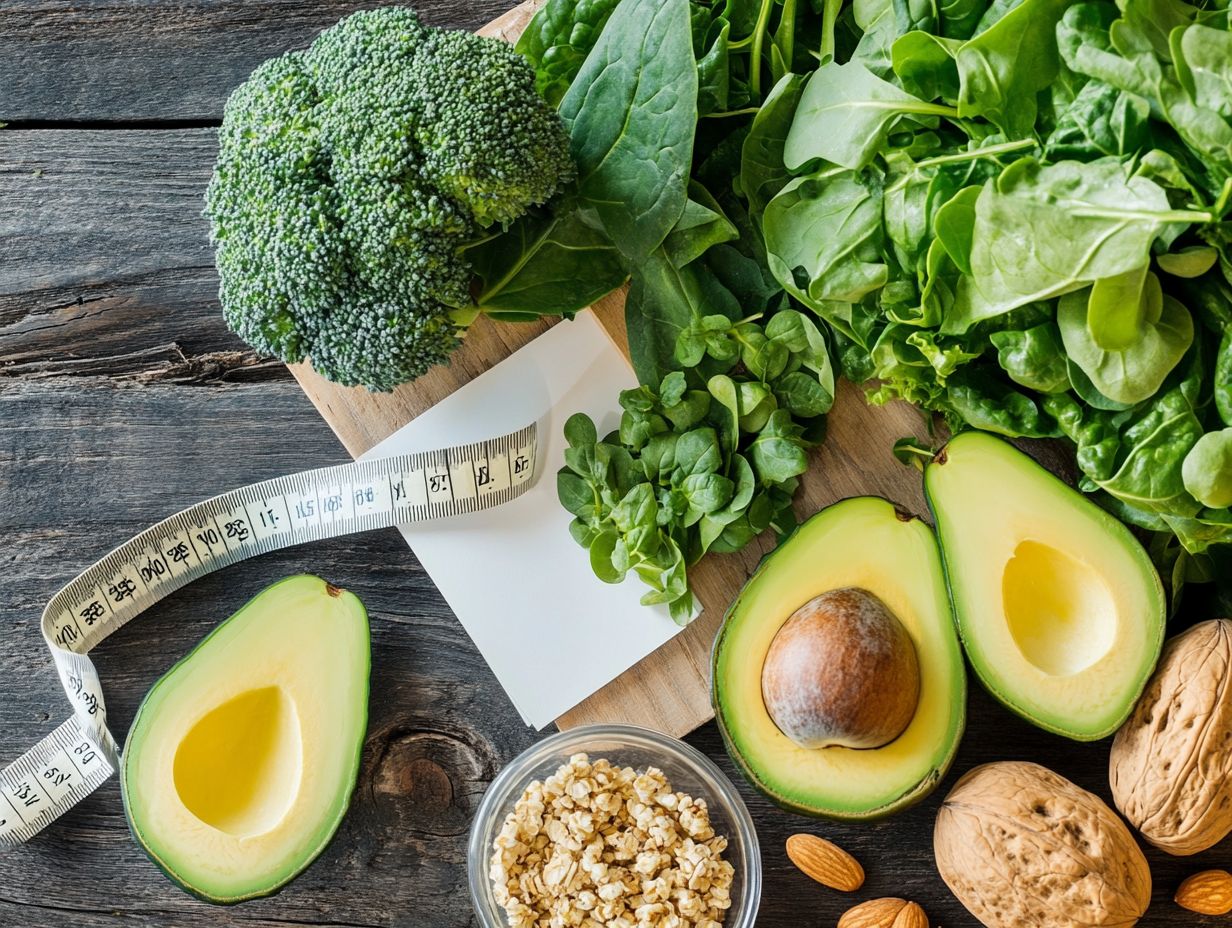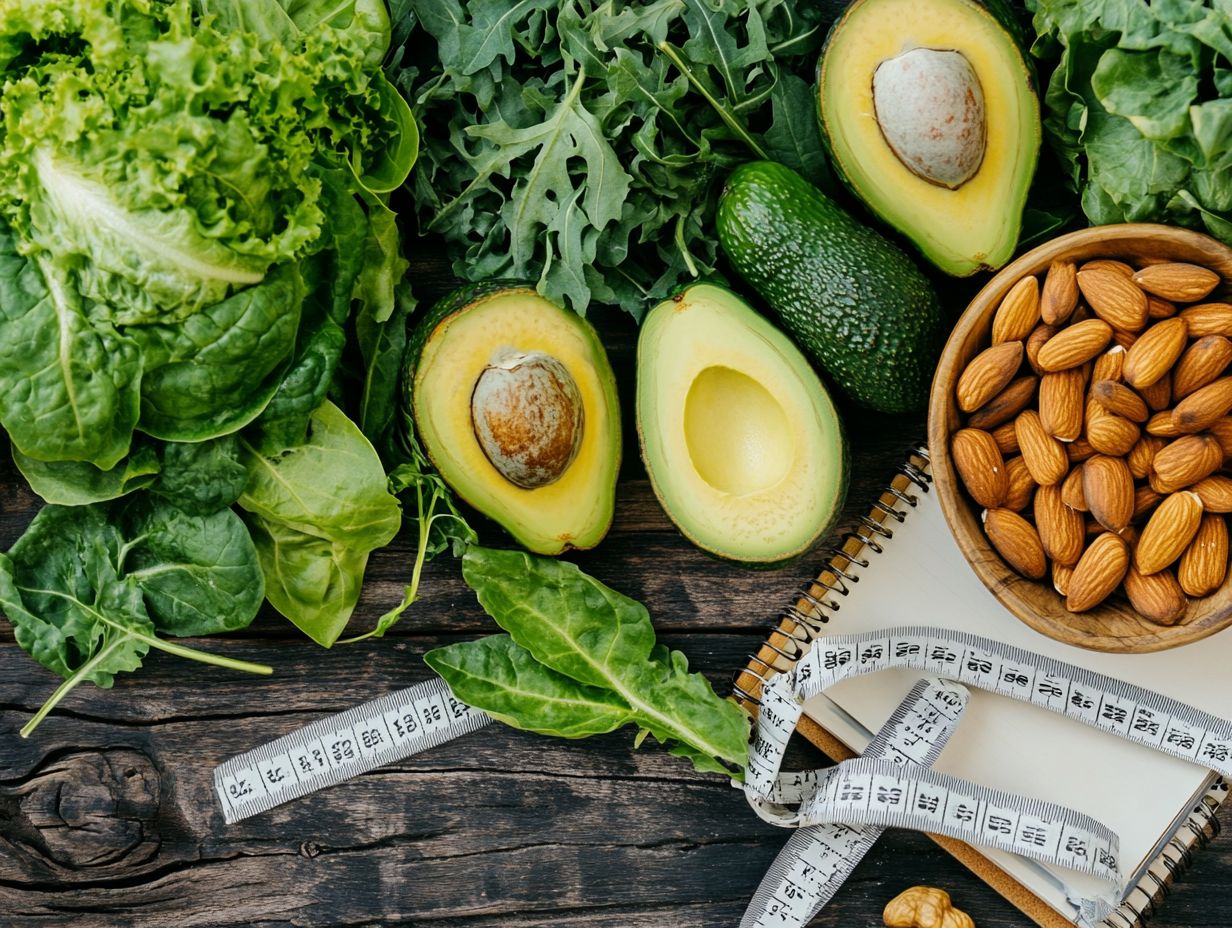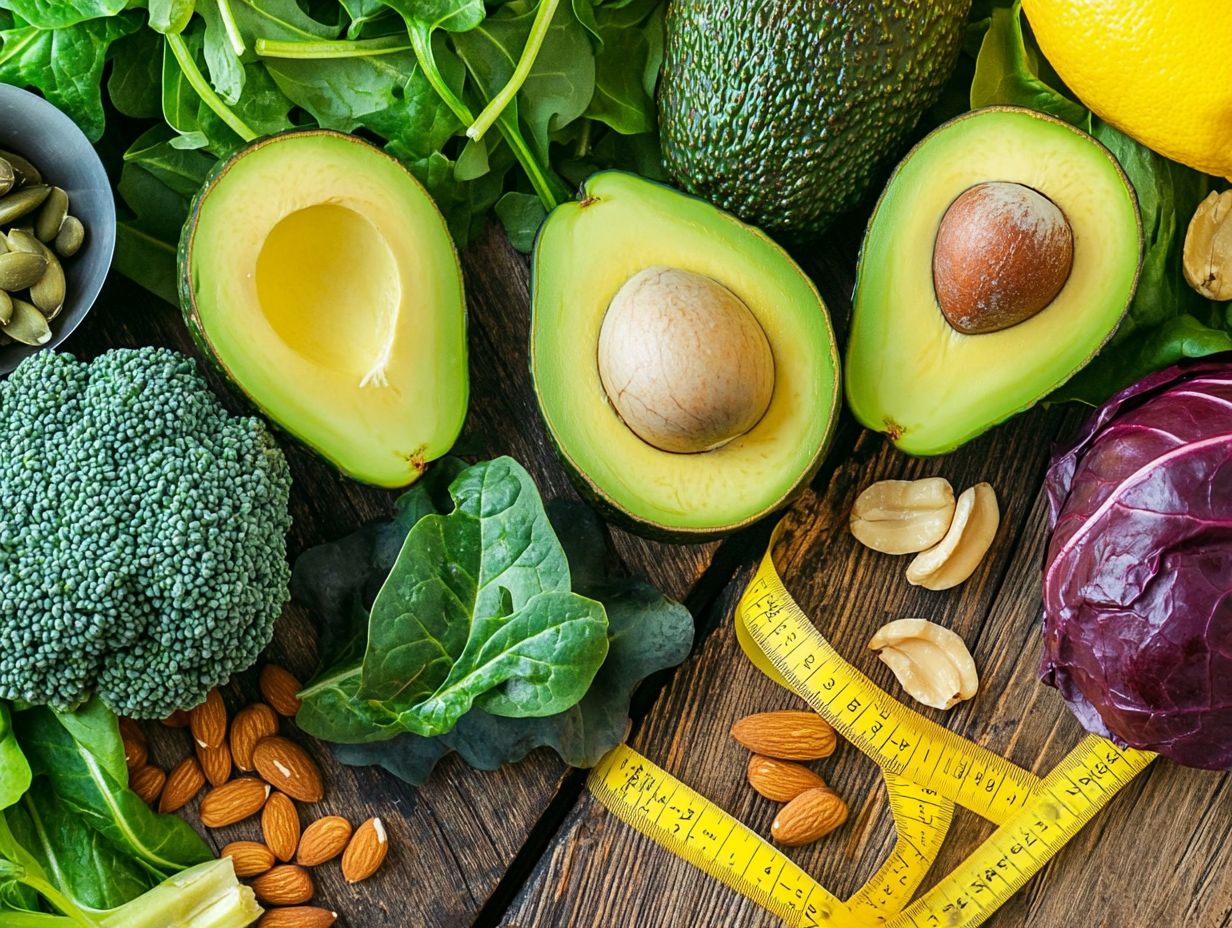Keto Diet: The Stories Behind the Success
Curious about the excitement surrounding the Keto diet? This low-carb, high-fat eating plan has certainly piqued the interest of those eager to shed pounds and enhance their overall health. Many have shared their keto success stories, highlighting the transformative power of this low-carb diet.
This article delves into what the Keto diet entails, how it functions, and what you can eat (and steer clear of) to embark on your weight loss journey.
You’ll discover not only the potential benefits and risks but also inspiring success stories that showcase remarkable real-life transformations.
Get ready to unlock the secrets of the Keto lifestyle!
Contents
- Key Takeaways:
- What is the Keto Diet?
- How Does the Keto Diet Work?
- What Can You Eat on the Keto Diet?
- What Are the Benefits of the Keto Diet?
- What Are the Risks of the Keto Diet?
- Understanding the Keto Diet: Key Considerations
Key Takeaways:

- The keto diet is a high-fat, low-carb eating plan that puts the body in a metabolic state called ketosis, which helps burn fat for energy.
- Keto-friendly foods include meats, eggs, low-carb vegetables, and healthy fats, while high-carb foods like grains and sugars should be avoided.
- Success stories of the keto diet include weight loss, improved blood sugar control, increased energy, and reduced inflammation. It may also pose risks like nutrient deficiencies, keto flu, and increased risk of heart disease. Consulting with a nutritionist can help mitigate these risks.
What is the Keto Diet?
The Keto Diet, commonly known as the ketogenic diet, is a highly sought-after low-carb eating strategy that promotes a process called ketosis. Ketosis is when your body burns fat instead of carbohydrates for energy. By dramatically cutting back on carbohydrates and substituting them with healthy fats, your body transitions its primary energy source from glucose to fats.
This shift not only facilitates effective weight loss but also brings a host of health benefits. This dietary approach has become increasingly popular among those facing challenges like obesity, type 2 diabetes, and insulin resistance, making it a compelling choice for various health concerns and personal weight loss journeys.
Combining the keto diet with intermittent fasting can amplify these benefits.
How Does the Keto Diet Work?
The keto diet operates by inducing a metabolic state known as ketosis, wherein your body becomes exceptionally adept at burning fat for energy instead of relying on carbohydrates.
By significantly cutting back on carbohydrate intake and increasing your fat consumption, this low-carb approach compels your body to convert fatty acids into ketones, which then become your primary energy source.
What is Ketosis?
Ketosis is a remarkable metabolic state where your body, faced with a shortage of carbohydrates, begins to burn fat for fuel. This shift can lead to effective weight loss and enhanced energy levels.
During this process, your liver converts fatty acids into ketones, which efficiently supply energy for your brain and other essential functions. This transformation is crucial as it prompts your body to move away from its dependence on glucose, derived from carbs, thereby minimizing those pesky insulin spikes.
Lower insulin levels encourage fat breakdown while inhibiting fat storage, greatly enhancing your overall fat loss. As a result, you may notice improved mental clarity and sustained energy throughout the day, steering clear of the typical energy crashes that often accompany high-carb diets. Incorporating self-care activities and mindful eating can further enhance these benefits.
The ketogenic diet does more than just support weight reduction; it also fosters changes in body composition, leading to increased muscle retention and improved metabolic health. This makes it a compelling choice for anyone looking to revamp their physique and embrace a healthier lifestyle.
What Can You Eat on the Keto Diet?
If you’re starting the keto diet, you can enjoy a variety of low-carb foods that align with your nutritional goals. This diet emphasizes foods rich in healthy fats while keeping carbohydrates to a minimum. Creating a meal plan with nutrient-dense meals can make this transition easier.
This includes a selection of nutrient-dense foods like avocados, nuts, seeds, and low-carb vegetables, all of which can be artfully integrated into delightful recipes and satisfying snacks.
Visiting a specialized low-carb grocery store like The Low Carb Grocery can equip you with the essential ingredients to thrive on your keto journey.
What Foods Should You Avoid on the Keto Diet?
To achieve success on the keto diet, it is crucial to steer clear of high-carbohydrate foods that could hinder your progress and trigger pesky sugar cravings. This means saying goodbye to refined sugars, grains, and starchy vegetables, as excess carbohydrates can disrupt your state of ketosis and undermine the health benefits of a low-carb lifestyle.
By implementing thoughtful dietary restrictions and making effective food swaps, you can successfully navigate your weight loss journey. You should also limit certain fruits, especially those high in sugar, such as bananas and grapes.
Be mindful that processed foods often hide carbohydrates that can sneak into your daily intake without you realizing. Highly refined oils and sauces might contain added sugars, which can negate the effectiveness of your ketogenic efforts.
Understanding which foods to avoid and replacing them with low-carb alternatives like leafy greens, avocados, and healthy fats will make your adherence to the keto diet much more manageable. This mindfulness not only supports sustained ketosis but also enhances your overall well-being. Regular consultations with experts like nutritionist Toby Amidor and Scott Keatley support you in maintaining your dietary goals.
What Are the Benefits of the Keto Diet?
The keto diet presents a wealth of health benefits, making it an enticing option for those seeking to shed pounds and enhance overall wellness. It offers a comprehensive approach to health improvement, addressing various health categories including mental health and body inflammation.
Get ready to experience amazing weight loss results, better blood sugar regulation, heightened energy levels, and decreased inflammation. These effects can positively influence various health concerns, including type 2 diabetes, prediabetes, and high blood pressure.
Embracing a ketogenic lifestyle can ultimately usher in transformative changes, elevating both your physical health and mental well-being.
1. Weight Loss

Weight loss stands out as one of the most celebrated benefits of the keto diet, effectively helping you shed those stubborn pounds by controlling calorie intake and promoting fat burning. Numerous success stories, like those shared by nutritionist Toby Amidor, illustrate how individuals embracing the ketogenic lifestyle have undergone impressive body transformations, crediting their results to reduced carbohydrate consumption.
At the core of this transformation is a significant reduction in insulin levels, which plays a crucial role in fat storage. When you minimize your carbohydrate intake, insulin production drops, prompting your body to pivot from burning glucose for energy to tapping into stored fat instead. By prioritizing higher fat and moderate protein consumption, you ll find yourself consuming fewer calories overall, as the satisfying nature of fats and proteins helps keep hunger at bay. Participating in weight loss competitions can provide additional motivation and accountability.
This metabolic shift not only paves the way for weight loss but also boosts your overall energy levels. Many testimonials celebrate advancements in both physical appearance and well-being, underscoring the keto diet’s remarkable potential when followed diligently.
Start your keto journey today!
2. Improved Blood Sugar Control
Improved blood sugar control is one of the standout advantages of the keto diet, especially if you’re managing type 2 diabetes or dealing with insulin resistance. By cutting back on carbohydrates, you can stabilize your insulin levels and reduce those pesky glucose spikes, leading to a notable enhancement in your overall health and metabolic function.
Research has consistently shown that adopting a low-carb, high-fat diet can yield substantial reductions in hemoglobin A1c levels, a crucial marker for long-term blood sugar management. Many individuals with diabetes have shared their experiences of reduced medication needs and increased energy levels after they made the switch to the keto diet.
The emphasis on whole foods loaded with healthy fats, combined with its positive effects on insulin sensitivity, give you the power to take charge of your health. This approach allows you to adopt a more balanced and proactive strategy in managing your condition, paving the way for a vibrant, healthier life.
3. Increased Energy
Increased energy levels stand out as a compelling benefit of the keto diet, allowing your body to become proficient at using fat as its primary fuel source instead of relying solely on glucose for energy. As you transition to this low-carb lifestyle, you might find yourself experiencing heightened energy and improved mental clarity, a testament to the efficiency of this diet plan.
One particularly fascinating aspect of the ketogenic diet is the shift in brain function. Many who adopt this lifestyle report enhanced focus and quicker problem-solving skills. For example, a close friend of yours, initially skeptical about keto, discovered that within just a couple of weeks, her mid-afternoon brain fog lifted, enabling her to tackle challenging work projects with a renewed sense of enthusiasm.
This mental clarity often comes alongside physical benefits, showing that the diet impacts both body and mind. Experts say the ketones produced during fat metabolism can serve as an ideal energy source for the brain, potentially enhancing various cognitive tasks such as memory retention and overall mental performance.
This amazing change can boost your daily productivity and overall quality of life!
4. Reduced Inflammation
The keto diet has been associated with a reduction in inflammation, a key player in many chronic health issues. By eliminating sugar and processed carbohydrates, this diet helps reduce inflammation in the body, paving the way for improved overall health and encouraging a more holistic perspective on wellness.
Research indicates this low-carb, high-fat lifestyle can significantly reduce inflammatory markers, particularly if you’re dealing with conditions such as arthritis, diabetes, or autoimmune disorders. The nutrient-dense foods featured in this diet supply essential vitamins and antioxidants that further aid in the fight against inflammation.
By adopting this dietary strategy, you can take charge of your health and elevate your quality of life. Not only does it assist in weight loss, but it also promotes better energy balance and mood stability.
Therefore, embracing the keto diet can serve as a comprehensive approach for those seeking respite from the challenges of chronic inflammation.
What Are the Risks of the Keto Diet?
While the keto diet presents a range of enticing health benefits, it’s crucial to recognize the potential risks that accompany this low-carb lifestyle. You should be aware of key concerns, such as nutrient deficiencies that can arise from limited food choices, the notorious keto flu that some individuals face during the initial adjustment period, and the possibility of an increased risk of heart disease if unhealthy fats are consumed in excess.
Consider consulting a healthcare professional to discuss the best approach to starting the keto diet and how to mitigate these risks.
Understanding the Keto Diet: Key Considerations
1. Nutrient Deficiencies
Nutrient deficiencies can easily creep in when you’re navigating the keto diet without a well-thought-out meal plan and diligent monitoring of your dietary restrictions. Excluding various food groups might leave you short on essential vitamins and minerals, so it s wise to consider nutritional therapy or supplementation.
To counteract these risks, you should craft balanced meal plans that emphasize whole foods like leafy greens, avocados, nuts, and fatty fish. By incorporating a diverse array of low-carb vegetables and healthy fats, you can help ensure you re getting all the necessary nutrients your body craves.
Keeping a close eye on your micronutrient intake through food diaries or apps can shed light on any potential deficiencies you may face. Plus, experimenting with different keto-friendly recipes not only diversifies your diet but also makes healthy eating an enjoyable adventure.
Don t hesitate to consult with a healthcare provider or nutritionist to develop a tailored approach that addresses your nutritional needs while still adhering to keto guidelines.
2. Keto Flu
Keto flu refers to the flu-like symptoms you might encounter when transitioning to the keto diet think fatigue, headaches, and irritability. This temporary phase emerges as your body adjusts to a new fuel source, but you can ease the discomfort through proper hydration and self-care methods.
As you shift from burning carbohydrates to prioritizing fats for energy, you may face additional challenges such as nausea, muscle cramps, and difficulty sleeping. These symptoms often stem from a drop in insulin levels and an increase in ketone production, which can disrupt your normal metabolic processes.
To alleviate these discomforts during this adjustment period, it s essential to focus on hydration, consume electrolytes, and engage in self-care practices like light exercise or relaxation techniques. By doing so, you can easily make your transition smoother and more enjoyable!
3. Increased Risk of Heart Disease

The keto diet could increase your risk of heart disease if you’re indulging in unhealthy fats without considering your overall dietary restrictions. This oversight can lead to higher cholesterol levels and compromised cardiovascular health.
It’s crucial for you to focus on incorporating heart-healthy fat sources like avocados, olive oil, and nuts while minimizing the saturated and trans fats often found in processed foods and red meat. By doing this, you can better support your cardiovascular health.
Routine check-ups to monitor your lipid profiles and other heart-related metrics will offer valuable insights into how your diet is affecting your overall well-being. Monitoring your lipid profiles regularly will offer valuable insights into how your diet is affecting your overall well-being.
Taking this proactive approach not only aids you in making informed dietary choices but also gives you the power to maintain a healthier lifestyle while reaping the benefits of the keto diet.
How to Start the Keto Diet?
Embarking on the keto diet entails a few essential steps that will set you up for success. Begin by calculating your macros, as this understanding is crucial for effective weight maintenance and meeting your nutritional needs throughout your keto journey.
Next, stock your kitchen with keto-friendly foods, ensuring you have the right ingredients on hand. Finally, create a structured meal plan to guide your daily choices and keep you on track. With these foundational elements in place, you ll be well-equipped to navigate your keto lifestyle with confidence.
Start today to kick off your keto journey!
1. Calculate Your Macros
Calculating your macros is an essential first step in embracing the keto diet. This process enables you to determine the optimal distribution of fats, proteins, and carbohydrates tailored to your individual goals and calorie budget. This personalized strategy can significantly enhance the effectiveness of your nutritional therapy, which supercharges your weight loss journey.
To kick off this process, you ll want to establish your daily caloric needs. You can utilize the Mifflin-St Jeor equation or various online calculators that consider factors such as your age, gender, weight, height, and activity level.
Once you ve pinpointed your total caloric intake, the next step is to apply the standard keto ratio of nutrients approximately 70-75% fats, 20-25% proteins, and 5-10% carbohydrates. By multiplying your total daily calories by these percentages, you can determine the precise grams of each macronutrient you should aim for each day.
Leveraging macro-tracking apps can simplify this process, making it effortless for you to log your food intake and stay on track with your keto diet.
2. Stock Up on Keto-Friendly Foods
Stocking up on keto-friendly foods is crucial for maintaining a successful ketogenic lifestyle. It ensures you have the right ingredients at your fingertips to whip up delicious and satisfying meals. Utilizing a low-carb grocery store or a detailed shopping list makes grocery trips a breeze!
To make the most of your grocery runs, concentrate on staples like leafy greens, avocados, eggs, and high-quality meats. These options are not only nutrient-dense but also versatile for a variety of recipes.
Incorporating healthy fats from sources such as nuts, seeds, and olive oil can elevate the flavor and satisfaction of your dishes. While you shop, consider exploring the bulk section for cost-effective options.
Always take a moment to read food labels to avoid hidden sugars. Prioritizing fresh produce and frozen vegetables can help you minimize waste while keeping your meals exciting and in line with low-carb guidelines.
3. Plan Your Meals
Effective meal planning is the backbone of your keto journey. It gives you the power to prepare recipes and healthy snacks that align with your weight loss and body transformation goals. By taking the time to plan your meals in advance, you can sidestep unhealthy food choices and ensure you re meeting your nutritional needs.
Creating a structured meal plan is essential for maintaining consistency, a critical factor for success on this low-carb path. Embrace a variety of protein sources, such as fish, chicken, and even plant-based options, while prioritizing healthy fats from avocados, nuts, and oils to enrich your nutrient intake.
When you develop recipes, aim for dishes that are both simple and bursting with flavor, utilizing seasonal ingredients to keep things fresh and exciting.
Remember to stock up on an assortment of snacks like cheese sticks, hard-boiled eggs, and keto-friendly nut mixes. These will help keep your energy levels stable throughout the day.
Ultimately, consistent meal prepping not only streamlines your cooking routine but also plays a vital role in achieving lasting body transformation.
Success Stories on the Keto Diet
Success stories surrounding the keto diet reveal the remarkable transformative potential of this dietary approach. Individuals from all walks of life, including personal trainers and everyday people, share their inspiring weight loss journeys and health enhancement experiences. The inclusion of nutrient-dense foods and healthy snacks further supports their progress.
The positive lifestyle changes they ve achieved through the keto diet highlight its effectiveness in fostering not only physical well-being but also mental clarity and vitality. This holistic approach also promotes insulin resistance management.
Success stories demonstrate the keto diet’s amazing potential for change. From trainers to everyday people, their transformations show how powerful this lifestyle can be for health and vitality.
1. Weight Loss Success Stories
Weight loss success stories flourish within the keto community, showcasing the remarkable transformations individuals have experienced by embracing this low-carb lifestyle. Countless testimonials, such as those shared by nutritionist Toby Amidor and nutritionist Scott Keatley, narrate incredible journeys where individuals have not only shed substantial pounds but also discovered a newfound sense of confidence.
Take Sarah, for example. She managed to drop over 60 pounds in just six months by incorporating healthy fats and cutting back on carbs. This transition didn’t just help her achieve her weight loss goals; it also elevated her overall energy levels. Her body transformation included improvements in managing sugar cravings and adopting low carb options.
Then there’s Mike, who struggled with obesity for years before he decided to embrace the keto diet. By meticulously planning his meals and incorporating intermittent fasting and calorie budgeting, he lost 80 pounds. His journey and others like him can be found in real keto success stories.
This achievement significantly reduced his risk of type 2 diabetes. These inspiring accounts illustrate how the keto lifestyle can facilitate lasting change, motivating countless others to embark on their own transformative journeys.
2. Improved Health and Medical Conditions

Many success stories surrounding the ketogenic diet emphasize not just weight loss but also significant improvements in health and the management of conditions like type 2 diabetes and polycystic ovary syndrome (PCOS). You may find individuals reporting better health markers, showcasing the ketogenic diet as a comprehensive approach to well-being. For instance, proper healthy eating habits and integrating self-care activities have been vital in these transformations.
Adopting a keto lifestyle could lead to reduced inflammation and improved cardiovascular health, making it an appealing choice if you’re grappling with heart-related issues. The low-carb nature of the diet may assist in regulating insulin levels, which is particularly beneficial for those managing metabolic syndrome. This diet can fit into a broader health improvement plan, addressing various health aspects and health issues.
Beyond weight loss, the ketogenic diet can elevate your energy levels and sharpen your mental clarity, providing support for individuals facing neurological disorders such as epilepsy. These transformations show how the keto diet can tackle various health challenges, offering a holistic path to improved well-being. The National Institutes of Health has been actively researching these benefits.
Frequently Asked Questions
What is the Keto Diet and how does it work?
The Keto Diet is a high-fat, moderate-protein, and very low-carb diet designed to help the body enter a state of ketosis where it burns fat for energy instead of carbohydrates. Ketosis is a state where the body burns fat for energy instead of carbs. This state is achieved by drastically reducing carbohydrate intake and increasing fat intake.
What are the reported benefits of following the Keto Diet?
Many people have reported weight loss, improved blood sugar control, increased energy levels, reduced inflammation, and improved cognitive function while following the Keto Diet. It may also help with certain medical conditions such as epilepsy, PCOS, and Alzheimer’s disease. The diet also helps reduce body inflammation and manage high blood pressure.
What are some common misconceptions about the Keto Diet?
Some common misconceptions about the Keto Diet include thinking it is a high-protein diet, that all fats are considered healthy on the diet, and that it is a restrictive and unsustainable way of eating. In reality, the Keto Diet focuses on high-fat, moderate-protein, and healthy sources of fat, and can be sustainable with proper planning and monitoring. It’s also important to consider dietary restrictions and make appropriate food swaps for a balanced approach.
In conclusion, the keto diet offers a range of benefits, from weight loss to improved health markers, making it a worthwhile consideration for those looking to enhance their well-being. Always consult with a healthcare professional before starting any new diet for safety and effectiveness!
Understanding the Keto Diet
The Keto Diet has gained popularity but comes with risks. Here s what you need to know.
Are there any potential risks or side effects of following the Keto Diet?
Like any diet, the Keto Diet can lead to some side effects. These may include a lack of essential vitamins and minerals, constipation, muscle cramps, and keto flu, which is when you might feel tired or have headaches as your body adjusts. It’s crucial to talk to a healthcare professional before starting the Keto Diet.
What are some tips for success on the Keto Diet?
Planning and preparing your meals is key to success on the Keto Diet. Focus on whole, unprocessed foods, stay hydrated, and track your macronutrient intake to make the most of it.
Listening to your body s hunger cues can also help you succeed. Incorporating nutrient-dense meals and regular exercise will enhance your results.
Are there any success stories of people who have followed the Keto Diet?
Absolutely! Many have lost significant weight and improved their health by following the Keto Diet. Some individuals even report reversing type 2 diabetes. However, remember that everyone’s body is different, and results can vary.
Participating in weight loss competitions and following a structured keto meal plan can also lead to success!






